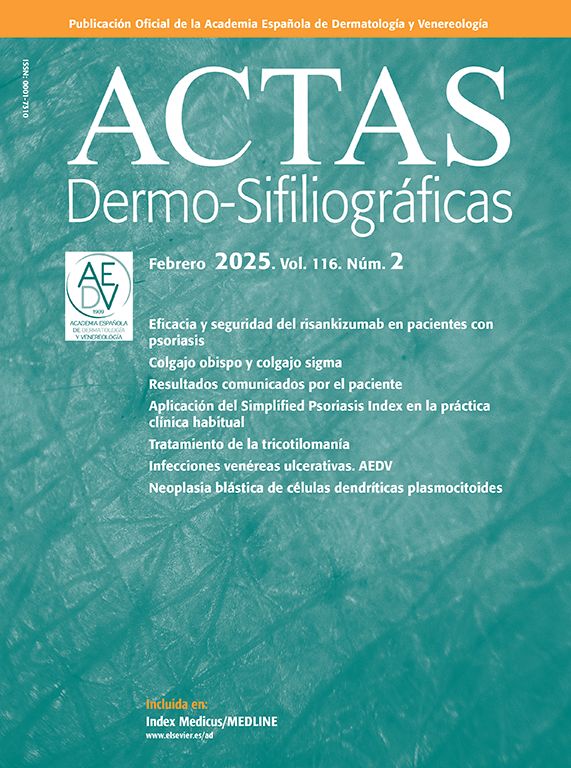Selective immunostaining for calretinin labels the innermost layer of the outer root sheath of normal hair follicles, which is difficult to distinguish with hematoxylin-eosin staining.
ObjectiveThe aim of this study was to determine whether immunohistochemistry for calretinin allows identification of cutaneous adnexal tumors with follicular differentiation towards cells of the outer root sheath.
Material and methodsWe analyzed the staining pattern for calretinin by immunohistochemistry in 49 biopsies of cutaneous adnexal tumors with follicular differentiation.
ResultsFifteen biopsies corresponded to trichilemmomas/inverted follicular keratosis and had staining for calretinin in the epithelium of the most superficial areas of the lesions and in squamous eddies. Ten were trichilemmal cysts, which displayed staining of the cyst wall. Three were basal cell carcinomas with variable staining according to the type of follicular differentiation in each variant. One was a panfolliculoma that had focal staining. Two were folliculosebaceous cystic hamartomas with staining of the excretory duct of the sebaceous glands. Two pilomatricomas and 3 proliferative trichilemmal tumors had positive staining in the cellular layers close to the lumen of the cystic structures. Nine trichoblastomas/trichoepitheliomas, 2 infundibular cysts, 1 dilated pore of Winer, and 2 acanthomas of the follicular sheath were negative for calretinin.
ConclusionImmunohistochemistry for calretinin allows identification of cutaneous adnexal tumors of the hair follicle or a component of the follicle with differentiation towards cells of the outer root sheath.
La inmunotinción selectiva con calretinina evidencia la capa más interna de la vaina radicular externa del folículo piloso normal, difícil de distinguir con la tinción de hematoxilina-eosina.
ObjetivoConocer si calretinina nos permite identificar neoplasias anexiales con diferenciación hacia la vaina radicular externa del folículo piloso.
Material y métodosHemos analizado el patrón de inmunotinción para calretinina en 49 biopsias de distintas neoplasias anexiales cutáneas con diferenciación folicular.
ResultadosQuince de las 49 tinciones correspondían a tricolemomas/queratosis folicular invertida, observándose positividad con calretinina en el epitelio de las áreas más superficiales de la lesión y en los remolinos escamosos; 10 quistes tricolémicos con positividad en su pared, tres carcinomas basocelulares con positividad variable dependiendo del tipo de diferenciación folicular de cada variante, un panfoliculoma con positividad focal, dos hamartomas sebáceos infundíbulo-quísticos con positividad en el conducto excretor de las glándulas sebáceas, dos pilomatricomas y tres tumores tricolemales proliferantes con positividad en las capas celulares cercanas a la luz de las estructuras quísticas, 9 tricoblastomas/tricoepiteliomas, dos quistes infundibulares, un poro dilatado de Winer y dos acantomas de la vaina folicular resultaron negativos.
ConclusiónEl estudio inmunohistoquímico de la calretinina nos permite identificar neoplasias anexiales del folículo piloso o componentes de éste, con diferenciación hacia la vaina radicular externa del folículo piloso.





